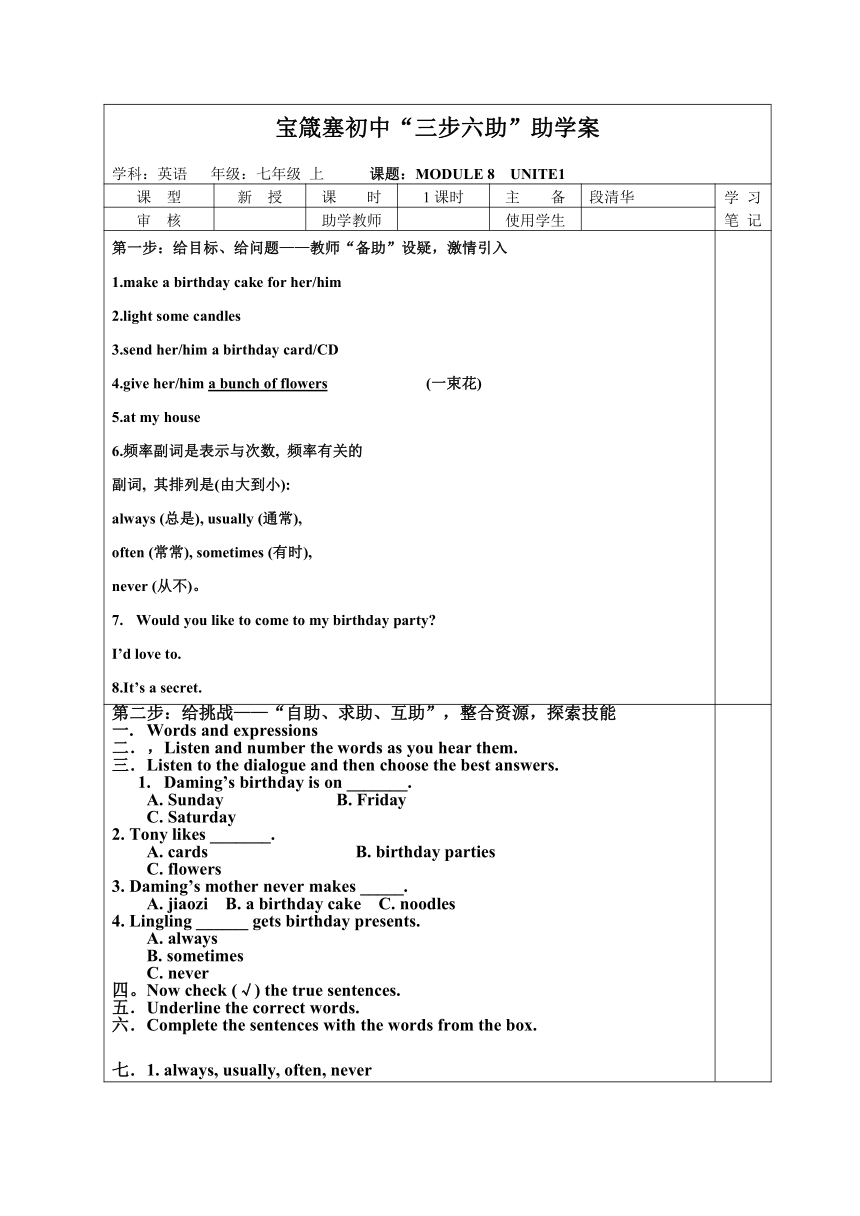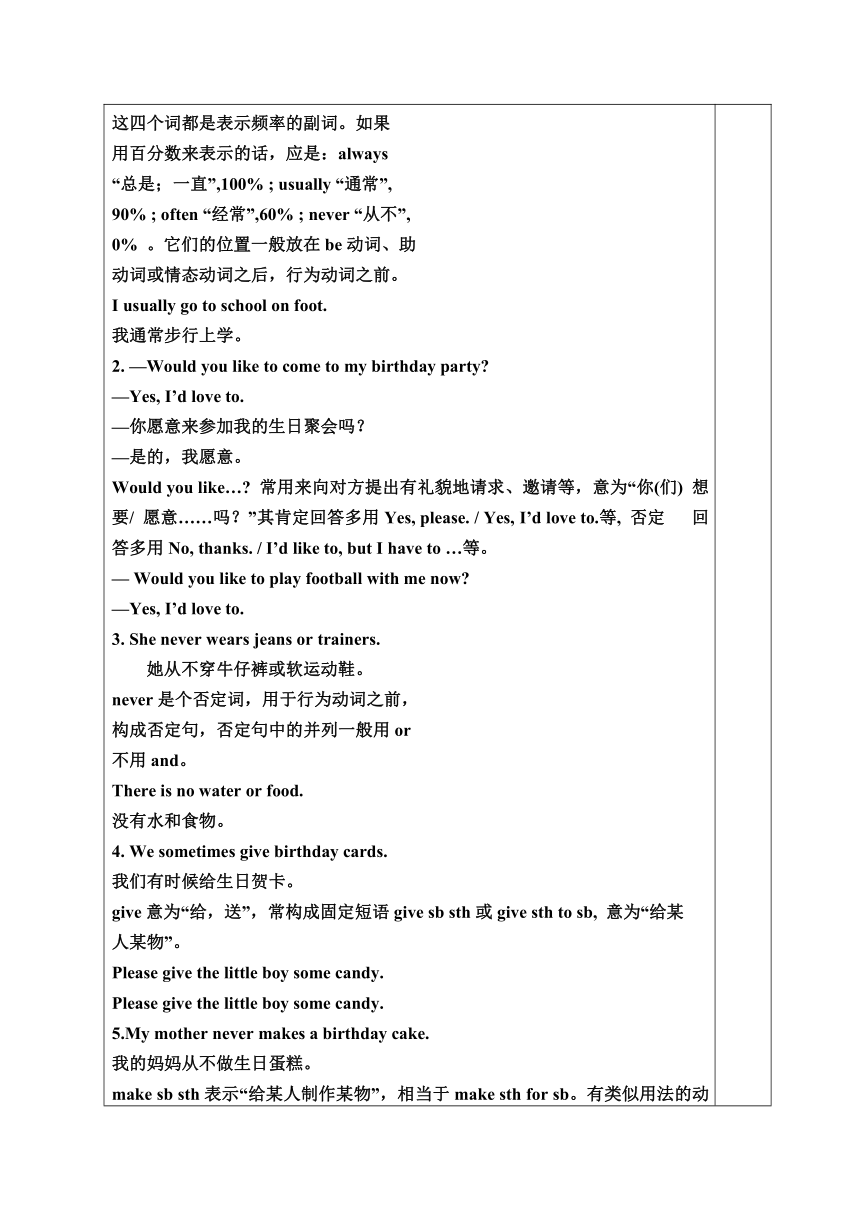外研版(2012新版)>七年级上>Module 8 Choosing presents>Unit 1 I always like birthday parties.
文档属性
| 名称 | 外研版(2012新版)>七年级上>Module 8 Choosing presents>Unit 1 I always like birthday parties. |

|
|
| 格式 | zip | ||
| 文件大小 | 14.8KB | ||
| 资源类型 | 教案 | ||
| 版本资源 | 外研版 | ||
| 科目 | 英语 | ||
| 更新时间 | 2013-02-28 19:45:45 | ||
图片预览


文档简介
宝箴塞初中“三步六助”助学案
学科:英语 年级:七年级 上 课题:MODULE 8 UNITE1
课 型
新 授
课 时
1课时
主 备
段清华
学 习 笔 记
审 核
助学教师
使用学生
第一步:给目标、给问题——教师“备助”设疑,激情引入
1.make a birthday cake for her/him
2.light some candles
3.send her/him a birthday card/CD
4.give her/him a bunch of flowers (一束花)
5.at my house
6.频率副词是表示与次数, 频率有关的
副词, 其排列是(由大到小):
always (总是), usually (通常),
often (常常), sometimes (有时),
never (从不)。
7. Would you like to come to my birthday party?
I’d love to.
8.It’s a secret.
第二步:给挑战——“自助、求助、互助”,整合资源,探索技能
一. Words and expressions
二.,Listen and number the words as you hear them.
三.Listen to the dialogue and then choose the best answers.
Daming’s birthday is on _______.
A. Sunday B. Friday
C. Saturday
2. Tony likes _______.
A. cards B. birthday parties
C. flowers
3. Daming’s mother never makes _____.
A. jiaozi B. a birthday cake C. noodles
4. Lingling ______ gets birthday presents.
A. always
B. sometimes
C. never
四。Now check (√) the true sentences.
五.Underline the correct words.
六.Complete the sentences with the words from the box.
七.1. always, usually, often, never
这四个词都是表示频率的副词。如果
用百分数来表示的话,应是:always
“总是;一直”,100% ; usually “通常”,
90% ; often “经常”,60% ; never “从不”,
0% 。它们的位置一般放在be动词、助
动词或情态动词之后,行为动词之前。
I usually go to school on foot.
我通常步行上学。
2. —Would you like to come to my birthday party?
—Yes, I’d love to.
—你愿意来参加我的生日聚会吗?
—是的,我愿意。
Would you like…? 常用来向对方提出有礼貌地请求、邀请等,意为“你(们) 想要/ 愿意……吗?”其肯定回答多用Yes, please. / Yes, I’d love to.等, 否定 回答多用No, thanks. / I’d like to, but I have to …等。
— Would you like to play football with me now?
—Yes, I’d love to.
3. She never wears jeans or trainers.
她从不穿牛仔裤或软运动鞋。
never是个否定词,用于行为动词之前,
构成否定句,否定句中的并列一般用or
不用and。
There is no water or food.
没有水和食物。
4. We sometimes give birthday cards.
我们有时候给生日贺卡。
give意为“给,送”,常构成固定短语give sb sth或give sth to sb, 意为“给某
人某物”。
Please give the little boy some candy.
Please give the little boy some candy.
5.My mother never makes a birthday cake.
我的妈妈从不做生日蛋糕。
make sb sth表示“给某人制作某物”,相当于make sth for sb。有类似用法的动词还
有buy等。如:I want to buy my brother a T-shirt. = I want to buy a T-shirt for my brother.
类似用法的词还有:
give sb. sth. = give sth. to sb. “给某人某物”
buy sb. sth. = buy sth. for sb.
“给某人买某物”
第三步:给点评、总结——教师“补助”点评、总结,提升知识与情感。学生“再助”查漏补缺,复习巩固
一、从方框中选择合适的单词填空。
never, loves, gets, has, often
On Tony’s birthday, he always ___ a birthday party. And he usually ____ some birthday cards from his parents and friends. He ____ gets a cake because he _____ cakes. But he _____ plays computer games.
二、用所给动词的适当形式填空。
1. Jack ___ (have) lunch at his house.
2. What about ________ (choose) this
present?
3. Daming _____ (wear) jeans.
4. He _____ (make) a robot model.
5. After school Tony ____ (do) his homework.
三、按要求完成句子。
1. Tom gives me a present. (改为同义句)
Tom _____ a present __ ___.
2. never, plays, he, games, computer
(连词成句)
____________________________.
3. She does her homework at home.
(改为否定句)
She ______ ___ her homework at home.
4. This Saturday is my birthday.
(就划线部分提问)
_____ __ _ your birthday?
四、根据汉语提示完成句子。
1. 托尼通常收到一张生日贺卡。
Tony ______ ____ a birthday card.
2. 他经常做蛋糕。
He ____ _____ a cake.
3. 他用汉语和英语唱歌。
He ____ the song in Chinese and English.
4. 生日聚会怎样?
_____ _____ a birthday party?
5. 我们从不举办生日聚会。
We _____ ____ a birthday party.
6. 迈克经常在他生日时收到礼物。
Mike often ______ _______ on his birthday.
学科:英语 年级:七年级 上 课题:MODULE 8 UNITE1
课 型
新 授
课 时
1课时
主 备
段清华
学 习 笔 记
审 核
助学教师
使用学生
第一步:给目标、给问题——教师“备助”设疑,激情引入
1.make a birthday cake for her/him
2.light some candles
3.send her/him a birthday card/CD
4.give her/him a bunch of flowers (一束花)
5.at my house
6.频率副词是表示与次数, 频率有关的
副词, 其排列是(由大到小):
always (总是), usually (通常),
often (常常), sometimes (有时),
never (从不)。
7. Would you like to come to my birthday party?
I’d love to.
8.It’s a secret.
第二步:给挑战——“自助、求助、互助”,整合资源,探索技能
一. Words and expressions
二.,Listen and number the words as you hear them.
三.Listen to the dialogue and then choose the best answers.
Daming’s birthday is on _______.
A. Sunday B. Friday
C. Saturday
2. Tony likes _______.
A. cards B. birthday parties
C. flowers
3. Daming’s mother never makes _____.
A. jiaozi B. a birthday cake C. noodles
4. Lingling ______ gets birthday presents.
A. always
B. sometimes
C. never
四。Now check (√) the true sentences.
五.Underline the correct words.
六.Complete the sentences with the words from the box.
七.1. always, usually, often, never
这四个词都是表示频率的副词。如果
用百分数来表示的话,应是:always
“总是;一直”,100% ; usually “通常”,
90% ; often “经常”,60% ; never “从不”,
0% 。它们的位置一般放在be动词、助
动词或情态动词之后,行为动词之前。
I usually go to school on foot.
我通常步行上学。
2. —Would you like to come to my birthday party?
—Yes, I’d love to.
—你愿意来参加我的生日聚会吗?
—是的,我愿意。
Would you like…? 常用来向对方提出有礼貌地请求、邀请等,意为“你(们) 想要/ 愿意……吗?”其肯定回答多用Yes, please. / Yes, I’d love to.等, 否定 回答多用No, thanks. / I’d like to, but I have to …等。
— Would you like to play football with me now?
—Yes, I’d love to.
3. She never wears jeans or trainers.
她从不穿牛仔裤或软运动鞋。
never是个否定词,用于行为动词之前,
构成否定句,否定句中的并列一般用or
不用and。
There is no water or food.
没有水和食物。
4. We sometimes give birthday cards.
我们有时候给生日贺卡。
give意为“给,送”,常构成固定短语give sb sth或give sth to sb, 意为“给某
人某物”。
Please give the little boy some candy.
Please give the little boy some candy.
5.My mother never makes a birthday cake.
我的妈妈从不做生日蛋糕。
make sb sth表示“给某人制作某物”,相当于make sth for sb。有类似用法的动词还
有buy等。如:I want to buy my brother a T-shirt. = I want to buy a T-shirt for my brother.
类似用法的词还有:
give sb. sth. = give sth. to sb. “给某人某物”
buy sb. sth. = buy sth. for sb.
“给某人买某物”
第三步:给点评、总结——教师“补助”点评、总结,提升知识与情感。学生“再助”查漏补缺,复习巩固
一、从方框中选择合适的单词填空。
never, loves, gets, has, often
On Tony’s birthday, he always ___ a birthday party. And he usually ____ some birthday cards from his parents and friends. He ____ gets a cake because he _____ cakes. But he _____ plays computer games.
二、用所给动词的适当形式填空。
1. Jack ___ (have) lunch at his house.
2. What about ________ (choose) this
present?
3. Daming _____ (wear) jeans.
4. He _____ (make) a robot model.
5. After school Tony ____ (do) his homework.
三、按要求完成句子。
1. Tom gives me a present. (改为同义句)
Tom _____ a present __ ___.
2. never, plays, he, games, computer
(连词成句)
____________________________.
3. She does her homework at home.
(改为否定句)
She ______ ___ her homework at home.
4. This Saturday is my birthday.
(就划线部分提问)
_____ __ _ your birthday?
四、根据汉语提示完成句子。
1. 托尼通常收到一张生日贺卡。
Tony ______ ____ a birthday card.
2. 他经常做蛋糕。
He ____ _____ a cake.
3. 他用汉语和英语唱歌。
He ____ the song in Chinese and English.
4. 生日聚会怎样?
_____ _____ a birthday party?
5. 我们从不举办生日聚会。
We _____ ____ a birthday party.
6. 迈克经常在他生日时收到礼物。
Mike often ______ _______ on his birthday.
同课章节目录
- Starte
- Module 1 My teacher and my friends
- Module 2 My English lesson
- Module 3 My English book
- Module 4 My everyday life
- Module 1 My classmates
- Unit 1 Nice to meet you.
- Unit 2 I'm Wang Lingling and I'm thirteen years ol
- Unit 3 Language in use.
- Module 2 My family
- Unit 1 Is this your mum?
- Unit 2 These are my parents.
- Unit 3 Language in use.
- Module 3 My school
- Unit 1 There are thirty students in my class.
- Unit 2 The library is on the left of the playgroun
- Unit 3 Language in use.
- Module 4 Healthy food
- Unit 1 We've got lots of apples.
- Unit 2 Is your food and drink healthy?
- Unit 3 Language in use.
- Module 5 My school day
- Unit 1 I love history.
- Unit 2 We start work at nine o'clock.
- Unit 3 Language in use.
- Revision module A
- Module 6 A trip to the zoo
- Unit 1 Does it eat meat?
- Unit 2 The tiger lives in Asia.
- Unit 3 Language in use.
- Module 7 Computers
- Unit 1 How do I write my homework on the computer?
- Unit 2 When do you use a computer?
- Unit 3 Language in use.
- Module 8 Choosing presents
- Unit 1 I always like birthday parties.
- Unit 2 She often goes to concerts.
- Unit 3 Language in use.
- Module 9 People and places
- Unit 1 We're enjoying the school trip a lot.
- Unit 2 They're waiting for buses or trains.
- Unit 3 Language in use.
- Module 10 Spring Festival
- Unit 1 Are you getting ready for Spring Festival?
- Unit 2 My mother's cleaning our houses and sweepin
- Unit 3 Language in use.
- Revision module B
